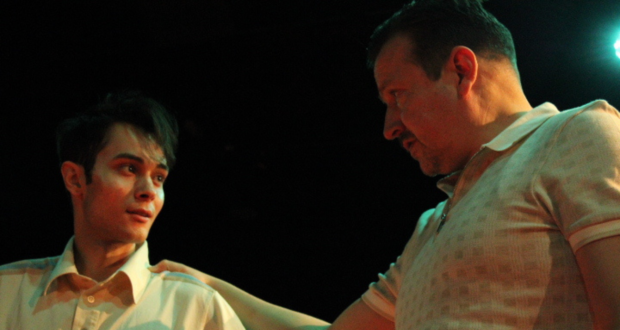A fascinating historical drama, bringing an important and relatively unknown story from apartheid South Africa to a wider audience.Summary
Rating
Good
Johannesburg, 1964, in apartheid South Africa. After a warning from the African Resistance Movement to the authorities is ignored, a bomb goes off in the city’s railway station, killing one and injuring 23 others. John Harris is alleged to have placed the bomb there, and is arrested.
The Only White is the true story of what happens after Harris’s arrest, told through the living room of a house occupied by the Hain family – friends and sometime political allies of John (Edward Sage-Green) and his wife, Ann (Avena Mansergh-Wallace).
Throughout the play, we see husband and wife Walter (Robert Blackwood) and Ad Hain (Emma Wilkinson Wright) with their son Peter (Gil Sidaway), conversing in that living room, occasionally joined by Ann. In the background of Malena Arcucci’s set, we see John in his ‘cell’ – a wooden box with open sides in which he remains trapped throughout the play, even during the interval. It is to be hoped that he has an effective chiropractor ready for the end of the run!
The story itself is enthralling, though it’s a shame that the blurb for the play gives away the ending. As it is, much of the dramatic tension stems from artificially created questions: Did John commit the act he’s accused of? Will he be found guilty? What will happen to him if he is found guilty? Alas, it turns out that the characters should know the answers to these questions from the start of the play, it’s just that they only happen to remember crucial facts or clues later on, which renders the developments unsatisfactory.
Early on, some of the dialogue grates. The playwright, Gail Louw, can’t rely on audience members having a detailed knowledge of 1960s South Africa, and much information is relayed through family conversations. This works to a certain extent, with the earnest and eager to help Peter constantly asking questions of Wal, but it sometimes feels like a lecture disguised as a play.
Thankfully, after that initial exposition, the chemistry between the performers, and the heartfelt relationship between the Hain and Morris families come to the fore. Despite some political differences, the Hains stand by the Morrises throughout their tribulations, offering Ann a place to stay and ensuring hidden messages are able to make their way to John’s cell.
Mansergh-Wallace as Ann and Sidaway as Peter – who later became a Labour MP and Lord – are the standout performers. The latter nails the mannerisms and tone of voice of an engaged yet naïve 14-year-old. At the beginning of the play, he’s constantly seeking reassurance from his father that the worst won’t happen, but he transforms before our eyes into a determined and fearless political campaigner.
All the characters are admirable; almost too admirable, so that they often seem to be devoid of human fallibility, making it peculiarly difficult to sympathise with these undoubtedly good people. A rare lighter moment involving a cricket ball in the second half is over too soon and comes too late in the play to have much meaningful impact. More of these moments could have turned it into a powerful family drama.
In the end, the play feels like it falls between two stools. It doesn’t make the most of the family drama, and, while it could have been an important meditation on how to resist, there isn’t enough to grip onto. Interesting discussions on the place of violent protest and on the nature of selfishness come to nothing. However, it remains a fascinating historical drama, bringing an important and relatively unknown story to a wider audience. One for the history aficionados.
Written by: Gail Louw
Directed by: Anthony Shrubsall
Produced by: Becca Rowson
The Only White plays at chelsea Theatre until 22 April. Further information and bookings can be found here.
 Everything Theatre Reviews, interviews and news for theatre lovers, London and beyond
Everything Theatre Reviews, interviews and news for theatre lovers, London and beyond



